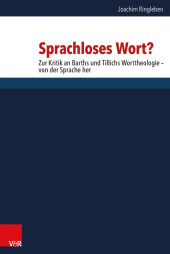 Neuerscheinungen 2015Stand: 2020-02-01 |
Schnellsuche
ISBN/Stichwort/Autor
|
Herderstraße 10
10625 Berlin
Tel.: 030 315 714 16
Fax 030 315 714 14
info@buchspektrum.de |

Joachim Ringleben
Sprachloses Wort?
Zur Kritik an Barths und Tillichs Worttheologie - von der Sprache her
2015. 200 S. 23.2 cm
Verlag/Jahr: VANDENHOECK & RUPRECHT 2015
ISBN: 3-525-56418-X (352556418X)
Neue ISBN: 978-3-525-56418-9 (9783525564189)
Preis und Lieferzeit: Bitte klicken
Joachim Ringleben erbringt den detaillierten Nachweis, dass sowohl in K. Barths sog. Wort-Gottes-Theologie also auch in P. Tillichs Symbol-Theorie das ´Wort Gottes´ um seinen spezifisch sprachlichen Sinn gebracht wird.
In this volume Joachim Ringleben offers detailed proof that both the Word of God theology of Karl Barth and the Symbol Theory of Paul Tillich do not properly reflect the specifically linguistic nature of the "Word of God." In this volume Joachim Ringleben shows that both Karl Barth and Paul Tillich neglect the important term "Word of God" and its linguistic nature. Although Barth based his dogmatic theology on the teachings of the Word of God, he set himself programmatically apart from a description of the deity of God in human language. Tillich conceived a nonlinguistic concept of symbol in the name of abstract transcendence, which relegates religion to prelinguistic references. In both cases this tendency to remove language carries with it the danger of eliminating the specifically linguistic meaning from the Word of God.
This volume takes a critical look at the texts of Karl Barth (KD I/1) and Paul Tillich (1957), both of whom neglect the idea of the "Word of God" in its written form.
In this volume Joachim Ringleben offers detailed proof that both the Word of God theology of Karl Barth and the Symbol Theory of Paul Tillich do not properly reflect the specifically linguistic nature of the "Word of God."
In this volume Joachim Ringleben shows that both Karl Barth and Paul Tillich neglect the important term "Word of God" and its linguistic nature. Although Barth based his dogmatic theology on the teachings of the Word of God, he set himself programmatically apart from a description of the deity of God in human language. Tillich conceived a nonlinguistic concept of symbol in the name of abstract transcendence, which relegates religion to prelinguistic references. In both cases this tendency to remove language carries with it the danger of eliminating the specifically linguistic meaning from the Word of God.
Joachim Ringleben proofs in detail that Karl Barth in his "Wort-Gottes-Theologie" as well as Paul Tillich (Symbol-Theory, 1957) fail to describe the term "Wort Gottes" as a decisive and important term linguistically.


